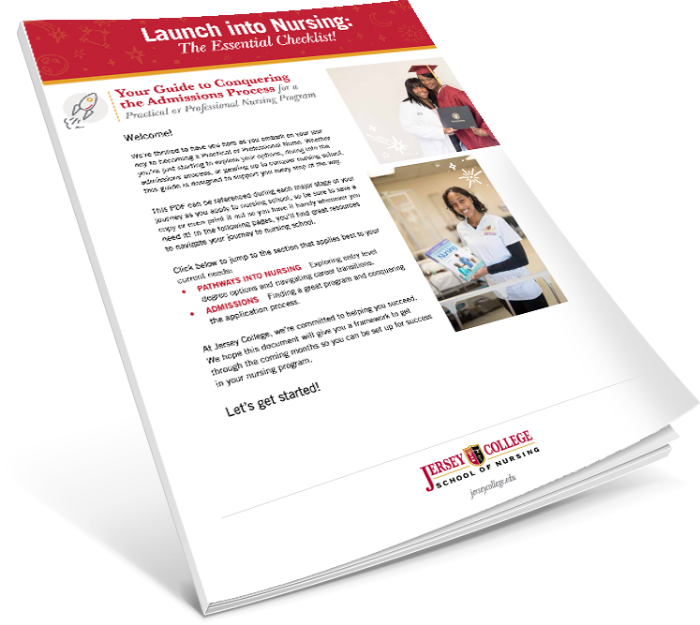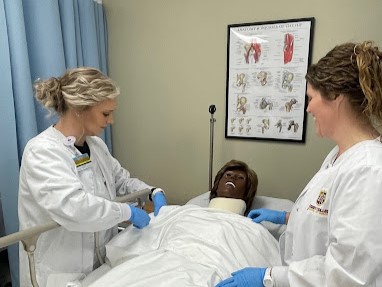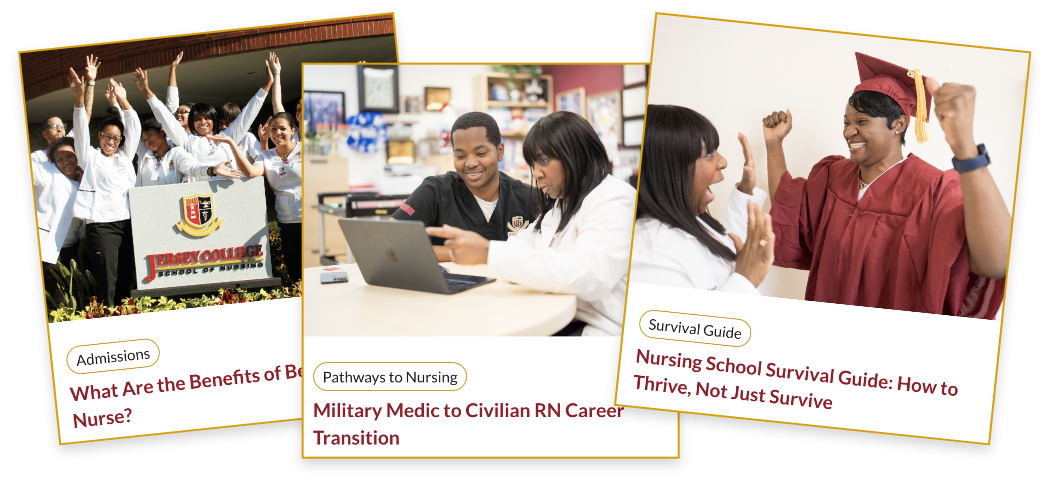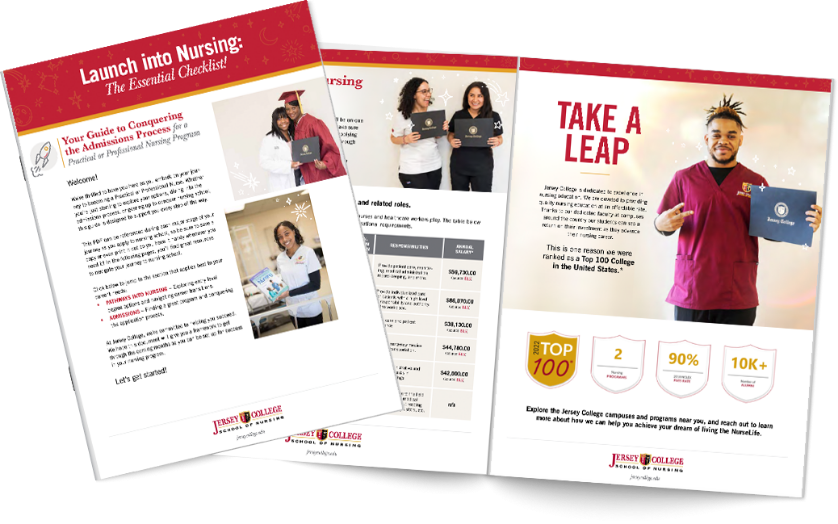
Changing to a Career in Nursing
The Demand for Nurses is Accelerating
Nurses are in high demand across the United States and around the world. The U.S. Bureau of Labor Statistics predicts a 6% growth in the need for registered nurses between 2023 and 2033, with nearly 200,000 nursing job openings per year. Globally, the World Health Organization expects a shortage of 9 million nurses by 2030.
Several factors are driving this increased demand for nurses:
- Aging populations require more healthcare as they develop chronic illnesses like diabetes and heart disease.
- Many current nurses are retiring.
- The COVID-19 pandemic and the rise of diseases like cancer have shown how crucial nurses are to strong healthcare systems.
This nursing shortage creates excellent opportunities for people considering a career change into nursing. Nursing offers stable employment, the ability to specialize in areas like pediatrics or critical care, chances for career growth, and the rewarding experience of improving people's health and lives every day. The demand for nurses makes now an ideal time to transition into this essential profession.
Chart Source: Analysis by Nurse.org based on data from the 2020 HRSA Nurse Workforce Projections report.
According to the data below, the following states are projected to experience the highest need for nurses by 2030:
- North Dakota
- Colorado
- Texas
- Florida
- Nevada
| Area Name | Projected RN Surplus/Deficit |
|---|---|
| Vermont | 105% |
| Maine | 103% |
| Rhode Island | 102% |
| West Virginia | 102% |
| Alabama | 101% |
| Connecticut | 101% |
| New Hampshire | 101% |
| Pennsylvania | 100% |
| Michigan | 100% |
| Ohio | 99% |
| New Mexico | 99% |
| Illinois | 99% |
| New Jersey | 99% |
| Wisconsin | 99% |
| Indiana | 98% |
| Mississippi | 98% |
| Missouri | 98% |
| Kansas | 98% |
| Kentucky | 97% |
| Idaho | 97% |
| Montana | 97% |
| Arkansas | 97% |
| Iowa | 96% |
| Wyoming | 96% |
| Tennessee | 95% |
| New York | 95% |
| Oklahoma | 95% |
| Minnesota | 94% |
| Nebraska | 94% |
| Delaware | 94% |
| Massachusetts | 94% |
| Maryland | 94% |
| South Dakota | 93% |
| Virginia | 93% |
| Hawaii | 93% |
| Louisiana | 93% |
| Alaska | 93% |
| Georgia | 92% |
| North Carolina | 92% |
| South Carolina | 91% |
| Oregon | 89% |
| Arizona | 89% |
| Utah | 89% |
| California | 89% |
| Washington | 89% |
| Nevada | 88% |
| Florida | 88% |
| Texas | 86% |
| Colorado | 86% |
| North Dakota | 84% |

FREE Essential Guide to Nursing School: Get Accepted, Survive, and Thrive!
Is it Too Late to Make a Career Change to Nursing?
Many individuals considering nursing as a second career may wonder if they've missed their opportunity, especially if they're later in life. However, it's never too late to pursue a fulfilling career in nursing. The nursing profession values the unique perspectives and experiences that older individuals bring to the table.
In fact, the average age of registered nurses (RNs) in the United States is around 44-46 years old, according to multiple sources. Data from the 2020 National Nursing Workforce Survey found the median age of RNs was 52, with 21.8% aged 31-40 and 13.5% over 60 years old. The American Association of Colleges of Nursing reports the median RN age as 46, while Data USA estimates the average age at 42.2 for male RNs and 43.7 for female RNs.
Life experience, maturity, and empathy are highly prized qualities in healthcare settings, as they can enhance the quality of patient care. Older individuals often possess a deep well of wisdom and emotional intelligence, enabling them to connect with patients on a profound level. Additionally, those embarking on a second career frequently demonstrate a high level of motivation and dedication, having made a conscious decision to pursue a meaningful path.
Nursing education programs welcome students of all ages, recognizing the invaluable contributions that diverse backgrounds and life experiences can bring to the field. While the journey may require commitment and hard work, the rewards of a nursing career are immense, offering personal fulfillment, job stability, and the opportunity to make a tangible difference in people's lives.
Regardless of your age or previous jobs, if you possess a passion for helping others and a desire to be part of a noble profession, a career change to nursing could be the perfect fit. Embrace your unique strengths and experiences, and let them guide you on this exciting new path.

Flexibility in Education and Careers
There are multiple educational pathways to becoming a nurse, each with different time commitments, costs, and potential career impacts.
- Diploma Programs: Typically takes 2-3 years at a hospital-based program to become a Licensed Practical Nurse (LPN).
- Associate's Degree in Nursing (ADN): Requires approximately 2-3 years to become a Registered Nurse (RN).
- Bachelor of Science in Nursing (BSN): A 4-year degree at a college or university.
- Direct-Entry Master's (MSN): Accelerated programs allowing non-nursing bachelor's degree holders to earn an MSN in as little as 3 years.
Nursing programs increasingly offer options like part-time scheduling, evening classes, accelerated or advanced placement programs, and online formats to accommodate diverse student needs. This flexibility is invaluable for those balancing education with work, family, or other commitments.
Related Resources:
Career Fulfillment
A career in nursing can offer a profound sense of purpose and fulfillment that stems from providing compassionate care and support to patients in their times of greatest need. Nurses play a vital role in alleviating suffering, promoting healing, and advocating for the well-being of individuals, families, and communities.
The nursing profession presents diverse opportunities to make a positive impact, catering to various interests and passions. At the bedside, nurses forge deep connections with patients, offering clinical expertise, emotional support, and guidance. Their presence and attentive care can profoundly influence a patient's journey toward recovery.

Beyond direct patient care, nurses can contribute to global health initiatives, working with organizations to address pressing healthcare challenges worldwide. From providing medical aid in crisis zones to developing public health policies and educational programs, nurses have the power to shape the future of healthcare on a global scale.
Nursing also offers opportunities in specialized fields, such as pediatrics, oncology, or mental health, allowing individuals to focus their efforts on areas that resonate most with their values and aspirations. Regardless of the chosen path, nursing is a profession that celebrates compassion, resilience, and a commitment to improving the lives of others.
By pursuing a mid-career change to nursing, individuals can find profound meaning and gratification in their work, knowing that their efforts make a tangible difference in the lives of those they serve. It is a calling that transcends mere employment, offering a lifelong journey of personal growth, professional fulfillment, and the opportunity to leave a lasting impact on the world.
Job Security and Growth
Nursing offers exceptional job security due to the constant demand for skilled professionals. As populations age and healthcare needs rise, employment opportunities are projected to continue to be available. Within nursing, there are numerous paths for career advancement including leadership roles, advanced practice (nurse practitioners, nurse anesthetists), and specialization in areas like pediatrics or oncology.
Beyond the Clinical Setting
While many nurses work in patient care, the field offers diverse roles beyond the bedside.
Nurses contribute to research advancing medical knowledge, public policy development influencing healthcare reforms, and community health education promoting wellness. Administrative positions in healthcare facilities overseeing operations and management are also options. Nurses can find roles outside of hospitals in areas like the military, home health, legal nurse consulting, healthcare recruiting, informatics, risk management, academic writing, and government positions at the federal/state/local level. The versatility of nursing allows for exploring varied career paths leveraging unique interests and making impactful contributions.
Related Resources:
Challenges in Healthcare
While nursing is an incredibly rewarding profession, it is not without its challenges. Nurses often face physically and emotionally demanding situations, including long hours, high-stress environments, and dealing with patient loss.
The National Nurses United survey found that 49% of nurses reported experiencing burnout, with many citing inadequate staffing, excessive overtime, and lack of break relief as contributing factors. The emotional toll of caring for critically ill patients and witnessing loss can also lead to compassion fatigue and secondary traumatic stress.
To manage these challenges, it's crucial for nurses to prioritize self-care and seek support. Strategies like mindfulness practices, exercise routines, and counseling can help alleviate stress and prevent burnout. Building a strong support network of peers and professionals who understand the unique demands of nursing is also invaluable.
By acknowledging the challenges and taking proactive steps to address them, nurses can better navigate the demands of their profession while maintaining their physical, emotional, and mental well-being, ultimately leading to improved patient care and job satisfaction.

Sign up to get new articles in your inbox and stay updated on our nursing programs.
Benefits Beyond Salary
While nursing salaries are competitive, the profession offers a comprehensive array of benefits that extend far beyond just compensation. Many healthcare employers provide robust benefits packages to attract and retain top nursing talent.
Common Benefits
Health insurance is typically one of the core benefits, with many employers offering medical, dental, and vision coverage for nurses and their families. Retirement plans like 401(k)s or pensions may also allow nurses to build savings for the future, often with employer-matching contributions.
Tuition assistance or reimbursement programs may enable nurses to further their education and advance their careers by pursuing additional certifications or degrees. Some employers even offer student loan repayment assistance as an added perk.
Other common benefits include paid time off, sick leave, life insurance, disability coverage, employee assistance programs, wellness incentives, childcare support, and flexible spending accounts. These benefits can contribute to improved work-life balance and overall well-being for nurses.
Personal and Professional Growth
Beyond the tangible benefits, nursing is a profession that facilitates immense personal growth. Nurses gain invaluable skills like critical thinking, problem-solving, communication, resilience, and the ability to stay calm under pressure.
The nursing role exposes individuals to diverse perspectives by interacting with patients from all walks of life. This cultivates empathy, cultural awareness, and a deeper understanding of the human experience.
Nurses can continually learn and expand their knowledge through ongoing training, specialization courses, and hands-on experience in various healthcare settings. This intellectual stimulation fuels professional development and career advancement prospects.
Community and Support
Perhaps one of the greatest benefits of being a nurse is the strong sense of community and camaraderie within the profession. This often begins in nursing school, where students develop lifelong bonds with their fellow cohort members. Upon graduation, they are welcomed to a community of alumni—at Jersey College, our alumni base includes over 10k graduates.
In the workforce, nurses typically develop deep bonds with colleagues who understand the unique challenges and rewards of the job.
Nursing organizations like the American Nurses Association provide valuable resources, networking opportunities, and advocacy efforts that support nurses throughout their careers. Local nursing communities may also offer mentorship, continuing education programs, and forums to connect with peers.
The nursing profession garners immense respect and appreciation from society. Nurses play a vital role in healthcare systems, and their contributions positively impact countless lives, creating a profound sense of purpose and fulfillment.
Frequently Asked Questions
-
How many hours can I work while in nursing school?
There is no one-size-fits-all answer, as it depends on your circumstances and the program's intensity. However, most nursing programs strongly discourage working more than 20 hours per week due to the rigorous coursework and clinical requirements. Many students find even part-time work very challenging to balance with nursing school.
-
How do I change my career to nursing?
The best thing you can do is get started! There are many pathways to nursing. You could:
- Enroll in an accelerated BSN or direct-entry MSN program if you already have a bachelor's degree in another field.
- Complete prerequisite courses and apply to a traditional 4-year BSN program.
- Obtain an LPN or ADN from an institution like Jersey College, and have the opportunity to bridge to a BSN or MSN later.
Our Admissions Representatives are here to answer your questions about pursuing a career in nursing. Please don’t hesitate to contact us!
-
How do I go to nursing school with a full-time job?
It is extremely difficult to work full-time while in a nursing program. Most schools advise reducing work hours as much as possible.
If you must work full-time:
- Look for evening program options to minimize conflicts.
- Discuss your situation openly with employers about needing flexibility.
- Build in study time by reducing other commitments temporarily.
- Utilize support systems like family, tutors, and student resources.
-
How late is too late to become a nurse?
It's never too late! Nursing embraces diversity, and older students bring valuable life experience. Many nursing programs have students of all ages. The average age of RNs in the U.S. is around 44-46 years old. What matters most is your passion for the field and dedication to succeed.
The key for any prospective nursing student is thoroughly researching programs, planning ahead for prerequisites and application requirements, and developing strategies to balance your responsibilities during the intensive nursing curriculum.
Start Your Transition Today
Jersey College offers practical and accessible nursing programs, catering to those starting or advancing in the nursing profession:
- Practical Nursing Diploma (PN or LPN): This program prepares students for a career as a Licensed Practical Nurse, focusing on essential nursing skills.
- Professional Nursing (Associate's Degree in Nursing - ADN): The ADN program is a pathway to becoming a Registered Nurse, with a curriculum geared towards the NCLEX-RN exam.
- LPN to RN Bridge Program: For LPNs looking to advance, this program provides a route to becoming an RN, balancing study with work commitments.
Our programs are designed for real-world nursing demands, offering a solid foundation for your nursing career. Jersey College is committed to providing quality education to aspiring nurses.
Find Your Campus
Based on the success of our programs, we have grown to serve communities in 7 states (and counting!). Find a campus near you to start your NurseLife.

FREE Essential Guide to Nursing School: Get Accepted, Survive, and Thrive!
